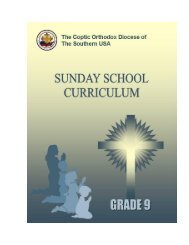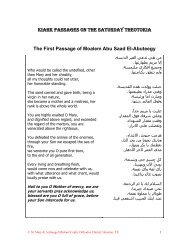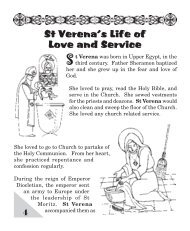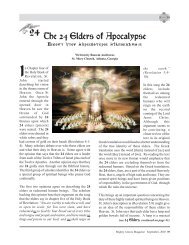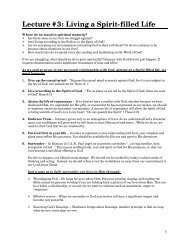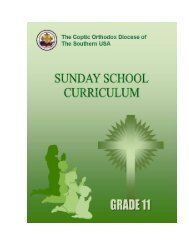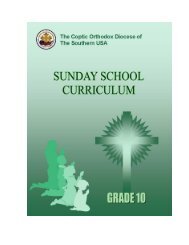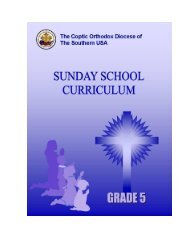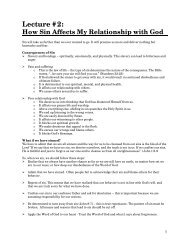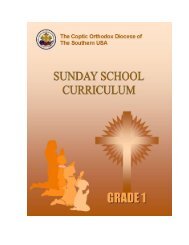Grade 12 - Coptic Orthodox Diocese of the Southern United States
Grade 12 - Coptic Orthodox Diocese of the Southern United States
Grade 12 - Coptic Orthodox Diocese of the Southern United States
You also want an ePaper? Increase the reach of your titles
YUMPU automatically turns print PDFs into web optimized ePapers that Google loves.
Sunday School Curriculum <strong>Grade</strong> <strong>12</strong><br />
Week 2 - Overview <strong>of</strong> <strong>the</strong> Pauline Epistles (I)<br />
Meditation:<br />
Lord Jesus, we pray that Your grace would work in us as abundantly as You allowed Him to work<br />
in <strong>the</strong> life <strong>of</strong> St. Paul. Give us wisdom as we try to live each epistle and understand <strong>the</strong> voice <strong>of</strong> Your<br />
Holy Spirit speaking through St. Paul to Your children.<br />
Objective:<br />
To be familiar with <strong>the</strong> fourteen epistles attributed to St. Paul in <strong>the</strong> New Testament<br />
To understand <strong>the</strong> <strong>the</strong>mes and <strong>the</strong> reasons for writing <strong>the</strong> different epistles.<br />
Memory Verse:<br />
―But by <strong>the</strong> grace <strong>of</strong> God I am what I am, and His grace toward me was not in vain; but I labored<br />
more abundantly than <strong>the</strong>y all, yet not I, but <strong>the</strong> grace <strong>of</strong> God which was with me‖ (1 Corinthians<br />
15:10).<br />
References:<br />
The Bible. The fourteen epistles <strong>of</strong> St. Paul: Romans; Corinthians First and Second;<br />
Galatians; Ephesians; Philippians; Colossians; Thessalonians First and Second; Timothy First<br />
and Second; Titus, Philemon, and Hebrews.<br />
Introducing <strong>the</strong> New Testament - Joe Blair.<br />
Different explanation books for <strong>the</strong> epistles - Fr. Tadros Y. Malaty.<br />
Introduction:<br />
St. Paul‘s epistles make up over 50% <strong>of</strong> all <strong>the</strong> books <strong>of</strong> <strong>the</strong> New Testament. In each <strong>of</strong> his<br />
fourteen epistles, St. Paul addressed different problems that <strong>the</strong> different Churches were going<br />
through. In some <strong>of</strong> his epistles, he was defending <strong>the</strong> Gospel <strong>of</strong> Christ as well as his authority as an<br />
apostle called by God. Each <strong>of</strong> <strong>the</strong> fourteen epistles had different <strong>the</strong>mes. The fourteen epistles <strong>of</strong> St.<br />
Paul are divided as follows along with <strong>the</strong>ir <strong>the</strong>mes:<br />
A. Eschatological Epistles<br />
1. 1 Thessalonians: Life in <strong>the</strong> light <strong>of</strong> Christ‘s return.<br />
2. 2 Thessalonians: Signs <strong>of</strong> Christ‘s return<br />
B. Stereological (chief) Epistles<br />
3. Romans: The righteousness <strong>of</strong> God through Christ for salvation<br />
4. 1 Corinthians: The nature and unity <strong>of</strong> <strong>the</strong> Church in Christ<br />
5. 2 Corinthians: Reconciliation through Christ<br />
6. Galatians: Freedom in Christ (Galatians 5:1)<br />
C. Prison Letters<br />
7. Ephesians: The universal Church: People <strong>of</strong> God in Christ<br />
8. Philippians: Joy in Christ<br />
130 THE GREAT FAST



